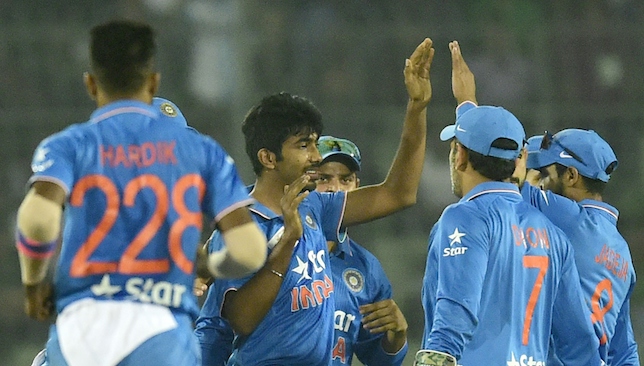
India’s clinical decimation of Bangladesh in the opening match of the Asia Cup on Wednesday makes them favourites to beat Pakistan too when the arch rivals meet on Saturday. But there could be a sting in the tail if MS Dhoni’s team drops their guard.
There is little doubt that this match is the blue riband event of the Asia Cup. One need hardly dwell in detail on how cricket between the two sub-continent teams overwhelms almost everything else in the sport. To put it briefly, the seduction of an Indo-Pak cricket match overpowers fans from either side of the border.
And because this number runs into millions, broadcasters, sponsors, advertisers et al don’t want to be left out, making for cricket’s biggest box-office show.
The lure of this rivalry has not diminished over time; if anything it has grown with the explosion in the media and a hardening of national fervour on either side of the border, every now and then inflamed by the volatile political relations between India and Pakistan.
Nor does it matter too much what the composition of the teams are. For instance, this time round India seem to be a well settled, experienced side while Pakistan are in the process of rebuilding, with four uncapped players in the squad.
That tilts the scales in India’s favour clearly – but only on paper. As history suggests, when these two teams take the field, passion and ambition can override all conventional parameters for assessment.
Javed Miandad’s last ball six which won Pakistan the Australasia Cup in Sharjah (1986) from a near hopeless situation is a case in point. So too India’s victories in the 1996 and 2003 World Cups when Pakistan looked much the better side in paper.
The big difference in this edition of the Asia Cup is that the matches have been recast as T20 affairs as a rehearsal for the World Twenty20 which follows immediately after. That mitigates the advantage of experience.
My argument is that the shorter the match, the more level the playing field. The prospects of upsets are enhanced because the T20 game is not as nuanced as ODIs, leave aside Test cricket which is infinitely more complex.
A cursory look at how T20 matches have panned out in the past decade will corroborate this. For instance, the ICC’s top-ranked side in this format until a few weeks back was the West Indies, which languishes at No. 8 in the Test rankings. That no side has won the World Twenty20 twice is a telling factoid too.
Therefore, while India are currently ranked No. 1 in Twenty 20s, they need to be watchful against Pakistan on Saturday. Overconfidence could cost them dear, as the experience against Sri Lanka in the first of the three-match series they played recently would have shown.
In that match at Pune, India were bowled out for under 100 in trying to bully and blow away an opposition that didn’t look strong on paper at all.
Sport can be cruel; even the best can be humbled by a seemingly weak but more diligent rival. Dhoni and his team, of course, learnt the lesson and recovered swiftly to win that series in grand style.
The first match against Bangladesh in the Asia Cup revealed the enormous depth in batting and bowling, as well as superb current form of most players. There were several outstanding personal performances – with Rohit Sharma, Hardik Pandya, Ashish Nehra and R Ashwin excelling – but the most important aspect of the first match in my opinion was Dhoni’s decision to play.
A back spasm had caused enough concern in the team management to fly out Parthiv Patel as cover for the Indian captain. It would have been an act of prudence had Dhoni skipped the match because the bigger challenge is obviously the World Twenty20.
That Dhoni took a late decision to play shows how intent he is on making this season count for himself and the team. He wants to be in charge, in the thick of things, aims to win the Asia Cup and the World Twenty20. This is affirmative action, as it were, which is a good sign for India.
A captain burdened by worry is more liable to become unduly defensive or reckless. Dhoni’s steps in the past few weeks have the spring of optimism in them.
All of this does not mean that Pakistan are pushovers. With the talismanic Shahid Afridi at the helm, and players like Mohamed Hafeez, Shoaib Malik, Wahab Riaz and the gifted Mohammed Amir around, the team is not exactly starved of talent or experience.
Ultimately though, as every time when India and Pakistan play each other, the issue will be decided by which team holds its nerve better.